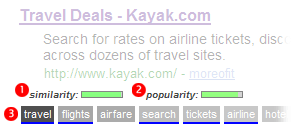You're looking for other sites like Moat-project:
|
|
moat-project.org. Index. Architecture. Clients. Credits. How-to. Ontology. Server. Primary links ... Especially people can use tags that have different ...
http://moat-project.org/
popularity:
tagging
semanticweb
ontology
rdf
moat
folksonomy
semantic
tags
metadata
tag
|
new
search by a custom tag signature
|
|
richard@cyganiak.de. Skype: richard.cyganiak. Phone: +353-87 ... http://richard.cyganiak.de/foaf.rdf#cygri. Web properties. My weblog. My FOAF file. Me in Twitter ...
similarity:
popularity:
semanticweb
people
research
rdf
person
tools
german
blog
cyganiak
semantics
|
|
|
No information avaiable
similarity:
popularity:
semanticweb
linkeddata
journalism
data
semantic
seo
media
linked-data
news
linked
|
|
|
No information avaiable
similarity:
popularity:
etsy
tips
tagging
tags
tag
advice
howto
read
tools
|
|
|
How RDF Databases Differ from Other NoSQL Solutions by Arto Bendiken. Parsing and ... How to Build an SQL Storage Adapter for RDF Data with Ruby by Ben Lavender ...
similarity:
popularity:
rdf
blog
semanticweb
sparql
linkeddata
startup
datagraph
|
|
|
No information avaiable
similarity:
popularity:
photography
metadata
tagging
keyword
iptc
keywords
organization
photo
caption
lightroom
|
|
|
No information avaiable
similarity:
popularity:
semanticweb
linkeddata
api
nytimes
tutorial
data
rdf
nyt
sparql
semweb
|
|
|
Paul Miller: writing, blogging, podcasting, presenting and consulting on Cloud Computing, the Semantic Web, Linked Data, Web 2.0, Web 3.0 and more
similarity:
popularity:
semanticweb
blog
cloud
cloudcomputing
cloud-computing
semantic
data
linkeddata
blogs
people
|
|
|
No information avaiable
similarity:
popularity:
rdf
nosql
comparison
database
databases
semanticweb
sparql
triplestore
sql
opendata
|
|
|
At the Semantic Technology conference in San Francisco today, Google gave an update of its rich snippets initiative - which adds extra information to Google search ...
similarity:
popularity:
google
microformats
semantic
search
seo
semanticweb
richsnippets
metadata
web
semantic+web
|
|
|
No information avaiable
similarity:
popularity:
delicious
tagging
tutorial
socialbookmarking
web2.0
technology
folksonomy
howto
education
k12online08
|
Sorting Results
- This slider determines how the matched sites are sorted.
- If you want to see the most popular sites that are somewhat related to your search, slide this more towards "popularity."
- If you want to see the sites that best matched your search, regardless of popularity, slide this towards "similarity."
Must Include Tags
- Matched sites will not be shown unless they have all of the tags on this list.
- This feature is useful for when you require a site to have been tagged as something.
- To add a tag to this list, click "add tag" or click on any tag in a result.
Must Not Include Tags
- Matched sites that have any tag on this list will not be shown.
- This feature is useful for filtering out results that have tags you are absolutely not interested in.
- To add a tag to this list, click "add tag" or click on any tag in a result.
Types of Results
- This option lets you specify the types of sites to show.
- If you want to only see domains (www.
.com), select "domains only." - If you want to only see articles (www.
.com/something/here), select "articles only." - If you don't care, or care so much about both, select "Both".
About The Results
 an example search result
an example search result
How moreofit Searches
Each website has a unique tag signature -- a set of words
that users have described the website as. Moreofit searches
for websites that have similar tag signatures and displays the results.
1: Similarity
A site's "similarity" is determined by how well its tag signature matches the tag
signature that is being searched for. A 100% match means that it has the exact same
tags in the exact same order, while a 0% match means it has no tags in common.
2: Popularity
The popularity of a website is, well, pretty much self explanatory.
3: Tag Signature
The tag signatures show how a site is described. The deeper the color of the tag,
the more frequently the website is tagged as this. Tags underlined blue denote a tag
that is in common with the search's tag signature.